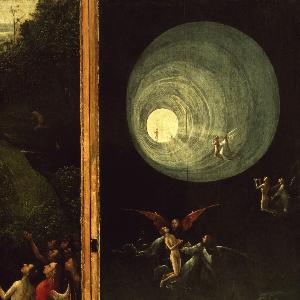“The idea of moving toward a bright light is popular”
28 Oct 2022
An interview with LMU scholar of religious studies Anna-Katharina Höpflinger about dealing with death and the attempt to gain control over it.
28 Oct 2022
An interview with LMU scholar of religious studies Anna-Katharina Höpflinger about dealing with death and the attempt to gain control over it.

Hieronymus Bosch: “Der Aufstieg in das himmlische Paradies”. | © picture alliance / akg-images | akg-images
PD Dr. Anna-Katharina Höpflinger is a lecturer (Akademische Rätin) at the Chair of Religious Studies and the History of Religion. In our interview, she explains which conceptions of the afterlife people tend to have today and whether religion can free people from the fear of death.
It’s often said that death has disappeared from society. Is there any truth to this?
Anna-Katharina Höpflinger: I’m not of the opinion that death has vanished from everyday life. For dying as a bodily process, it may be true: How we deal with it has been professionalized. Medical personnel look after it – it’s in the hands of specialists, so to speak. But death as a cultural concept is a different matter. After the Second World War, perhaps, there was a brief phase of directedness toward this world, especially in the cities, as a sort of reaction to the horrors and atrocities of the war years. But since the nineteen eighties at the latest, death has been a manifold presence in the culture again. In the guise of museum exhibitions, a skeleton on a heavy metal album, a Halloween costume, and in the crime thrillers on our TVs every evening.
Why are crime stories such perennial favorites?
In so-called industrial societies, it’s considered normal for a sort of “social death” to precede the physical one. What I mean is the expected incremental withdrawal from social duties: first retirement and then, some years later, death. If a person dies earlier, it is said that they were taken away too soon. Crime fiction dramatizes this too-early death. In crime stories, this is occasioned by a violent act – that is to say, a death that breaks the social order. This creates tension and gives us a “chill”. Only once the case has been solved is order restored and control regained.
Religions deal with uncontrollable areas of life – like, well, death. They explain, for example, what comes after death, although uncertainty remains.Anna-Katharina Höpflinger
So do people need the sense that they can gain control over death, and is that one of the roles of religion?
Religions deal with uncontrollable areas of life – like, well, death. They explain, for example, what comes after death, although uncertainty remains. As a scholar of religion, I would say: The question of death and what comes after it is a religious one. Even for secular people. Death transcends the observable world. Because it cannot be grasped, it has to be processed symbolically. How this is done is particular to specific eras and cultures.
Which images of the hereafter are dominant today?
Frequently images shaped by pop culture. For example, in so called Western Societies people picture themselves traveling toward a bright light. And belief in reincarnation can also be found in Germany. In the Christian faiths, the tendency is to present the afterlife in more positive terms than in past times such as the medieval period.
But when many people think about the afterlife today, they tend to picture a place where you are reunited with your relatives, a notion that is thoroughly influenced by movies and art. People typically have a positive conception of the life beyond, in which the individual lives on in their existing family structures.Anna-Katharina Höpflinger
Naïve ideas of purgatory, angels on clouds, and God with a big white beard are passé?
I wouldn’t call these notions naïve. They are symbols that help people deal with the uncontrollable. But when many people think about the afterlife today, they tend to picture a place where you are reunited with your relatives, a notion that is thoroughly influenced by movies and art. People typically have a positive conception of the life beyond, in which the individual lives on in their existing family structures.
Traditional rituals have declined.
That applies above all to cities, not so much for the countryside. But regardless of whether a body is donated to science or cremated, there are almost always rituals around death. Even placing the body in a casket is a ritual. For dying and coping with bereavement, social media have also taken on an important role. There are things like virtual candles and messages of condolence, which foster community and togetherness. These, too, are rituals.
The coronavirus has changed our relationship to dying and death. Suddenly people had to take leave of loved ones on tablet computers.Anna-Katharina Höpflinger
Has the pandemic sharpened our awareness of how important human closeness is for dying?
I hope so. The coronavirus has changed our relationship to dying and death. In the media, death was an important topic. Being locked down was itself a sort of “social death.” In intensive care units, social and physical deaths were happening at once. Suddenly people had to take leave of loved ones on tablet computers.
Now death is on our minds in the form of war – young soldiers are dying, civilians of every age, including children.
War thrusts the abnormal, the terrible, and the macabre aspects of death into the foreground. Personally, I find it ghastly when a person has to die for an ideology or power ambitions. Taking a more general view, we can say that war changes the idea of death. A soldier is obliged, for example, to give his or her body for a collective idea. This pushes the individual into the background.
What are we actually afraid of when we fear death?
For one thing, there’s the physical side: the pain, the loss of control. And then there’s the lack of knowledge about what happens. We can only observe death from the outside. And near-death experiences are shared by people who have not died. Death itself remains inaccessible.
Religions give meaning to life, specifically in the face of death.Anna-Katharina Höpflinger

Anna-Katharina Höpflinger
What exactly can religion do for us here?
Religion has the important social role of offering rituals and forms that bring people together. The traditional forms survive because in a difficult emotional situation, people don’t want to come up with new rituals, but go back to what they know. Moreover, religions cross the boundaries between life and death – for example, by creating images of the afterlife. As such, they give meaning to life, specifically in the face of death.
So do religious people find it easier to die?
I’d be skeptical about that. Maybe the prospect of giving an account of themselves to a deity is not actually so appealing. Religion, in my view, is not primarily about reassurance but about orientation. Religion gives us a guide for how to live. If life is a tangled forest, religiosity creates a path through the undergrowth. But it’s also possible of course to find such a path without religion.